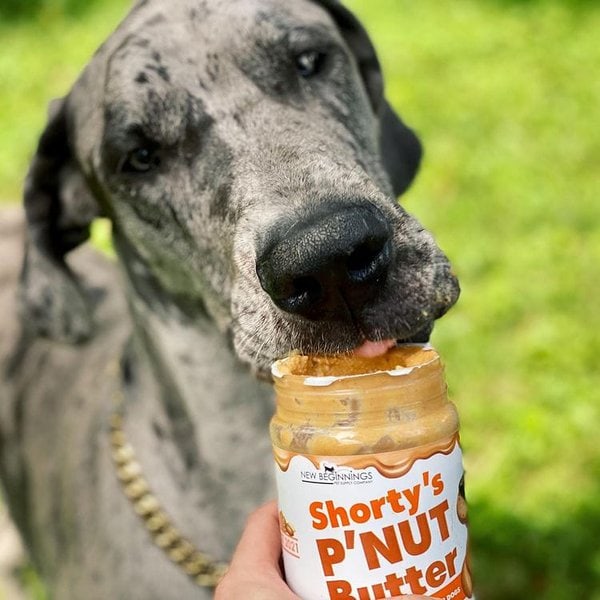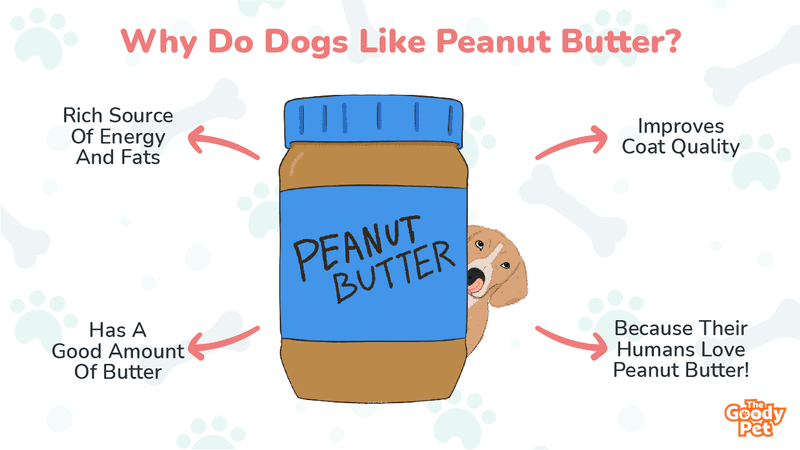The obsession with peanut butter is something that most dog parents can’t quite grasp, and the unending question about why dogs can’t seem to get enough of peanut butter has given us the motivation to write about this topic.
So, why do dogs like peanut butter? Dogs like peanut butter because it is rich in nutrients such as fats and proteins that are beneficial to their health because of the sweet taste, or perhaps it is because their humans love eating peanut butter a lot.
Now that we’ve established why dogs like peanut butter, is it safe for dogs to eat this meal, what benefits does eating peanut butter bring to a dog, and are there any dangers associated with a pooch eating peanut butter? Relevant answers to these questions are contained in this article. But before we get right into that, let’s take a critical look at why dogs are crazy about peanut butter.
Why Do Dogs Like Peanut Butter?
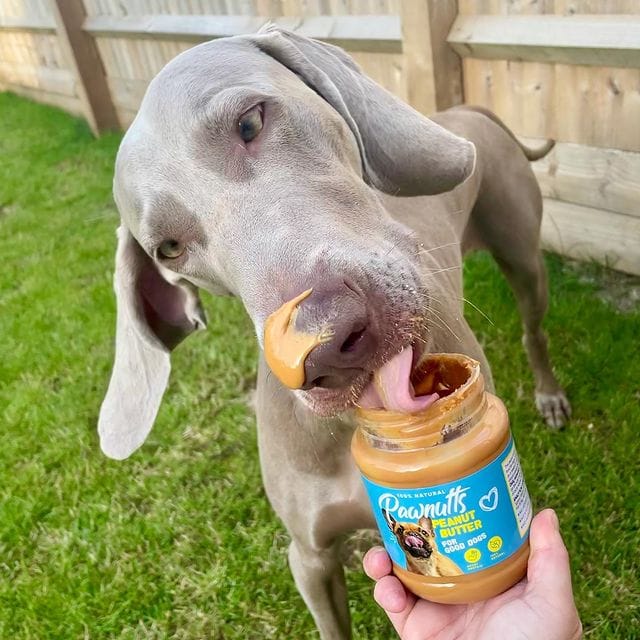
Dogs are crazy about peanut butter because it tastes extremely good to eat, and it contains several nutrients needed for a pooch’s physical development.
The reason behind why dogs love peanut butter so much is one that continues to remain shrouded in mystery. This hasn’t been helped by the fact that there has been no specific scientific study carried out to find out what it is that makes dogs go crazy with peanut butter.
Regardless, there are several possible explanations for this canine obsession with peanut butter, some of which we’ll attempt to explain below:
Peanut Butter Contains A High Amount of Butter
Dogs require a considerable amount of proteins to generate enough energy to carry out daily activities, and this can be gotten by consuming foods rich in protein.
The canine body, just like in humans, is conditioned to react well to foods that can be of immense nutritional benefits; Hence, it is only normal for pooches to go nuts when they get a taste or smell of peanut butter.
Peanut Butter Is Rich In Fats
Dogs are carnivores by heart, and a taste of animal-based fat that is commonly used in producing peanut butter may be too much for your canine buddy to handle.
Also, it is true that fatty foods taste better for dogs, and this is because they have a high amount of fat-related taste buds. And this could also be an explanation as to why dogs go crazy when they get a taste of the fat-rich peanut butter.
Peanut Butter Contains Sugar
The tip of a dog’s tongue is designed to react positively to the taste of sugar. Additionally, dogs are omnivores, which means that they have a sensitivity to sweetness. And as sugar constitutes a major component of peanut butter, it is only normal for our canine buddies’ interest to be piqued when they get a taste of this food substance.
Sugar in peanut butter, however, isn’t a deal-breaker for dogs, and they seem to like no-sugar peanut butter as much as products that contain a considerable amount of sugar.
Because Their Humans Love Peanut Butter!
There is a simpler explanation as to why dogs are so much in love with peanut butter, and this is because their favorite humans can’t seem to get enough of this food substance! When a dog observes its human eating the sweet-smelling peanut butter, it will be inclined to beg for some, and one taste of peanut butter is all it takes to get a dog addicted.
Can My Dog Eat Peanut Butter?
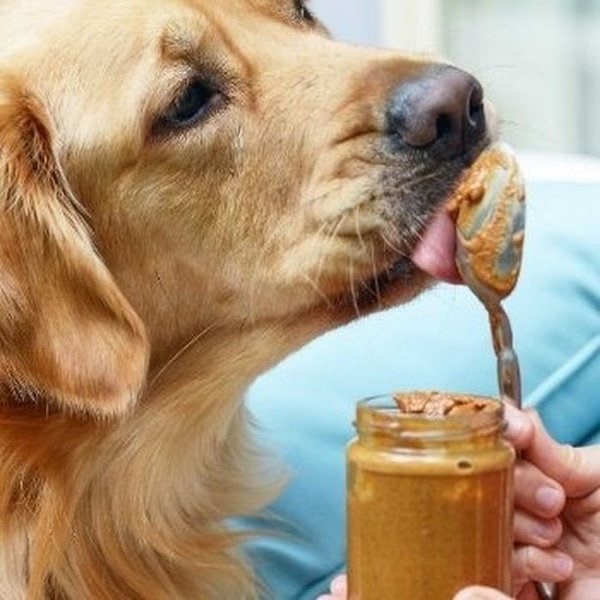
Yes, dogs can certainly eat peanut butter, provided it is fed in moderation and offered only as an occasional treat.
Peanut butter is mostly safe for dogs to eat, and when fed in little amounts, it can be a great source of nutrients such as proteins, healthy fats, and vitamins.
These nutrients can be of immense benefits to your canine buddy, healthwise, and what your dog stands to gain from consuming peanut butter rich in these nutrients is outlined in subsequent sections.
Additionally, food allergies are quite common with dogs; Hence, before including peanut butter in your canine buddy’s diet, you need to be certain that the fido isn’t suffering from a peanut allergy. Generally, it is advisable that you seek out a vet for advice before taking the bold step of including peanut butter in your fido’s diet.
How Much Peanut Butter Can You Feed Your Dog?
As mentioned earlier, peanut butter works best when it is included in a dog’s diet as an occasional treat.
And the general rule of thumb when feeding peanut butter – or any other treat – to a dog is that the amount of peanut butter given to a dog shouldn’t account for more than 10% of the pooch’s total daily caloric intake.
For large dogs, this 1% translates to slightly less than one teaspoon of peanut butter per day, while for small and medium-sized dogs, one-eighth of a teaspoon of peanut butter per day is okay.
What Are The Benefits Of Feeding My Dog With Peanut Butter?
Benefits of feeding your pooch with peanut butter include a more robust immune system, improved skin and coat quality, and also, energy to carry out daily activities.
Better Immune System
Peanut butter is a rich source of proteins and vitamins, and these contain properties that fortify a dog’s immune system, thereby making it easier for a dog to resist diseases. The antioxidants contained in peanut butter attack destructive radicals and ensure their non-harmful passage from a dog’s body,
Similarly, the proteins contained in peanut butter help a dog grow and develop body tissues and repair worn-out muscles.
Improves Coat Quality
Additionally, peanut butter contains a healthy amount of fats, and it is well known that fats contribute to healthier and glossier coats on dogs. Fats contained in peanut butter can help moisturize dry skin and also help clear a dog’s irritated skin.
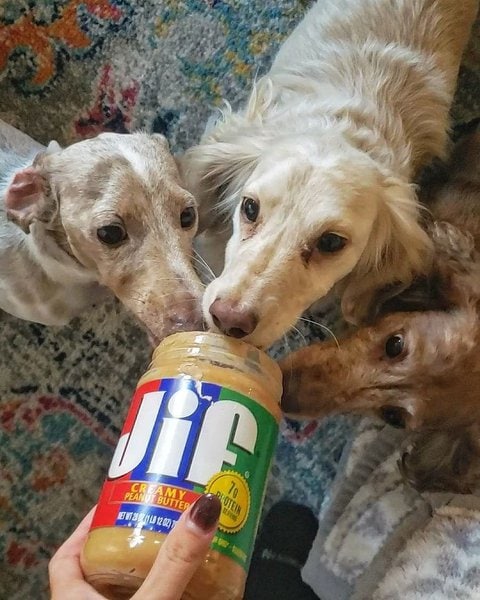
Rich Source Of Energy
Peanut butter contains proteins and healthy fats, but which are broken down within a dog’s body to release energy. Consequently, by feeding your pooch a moderate amount of peanut butter, along with its normal diet, you can ensure that the dog gets access to these key nutrients – proteins and fats – thereby providing the pooch with enough energy to run and play around the home.
What Are The Dangers Of Feeding Peanut Butter To My Dog?
Feeding a pooch with too much peanut butter can result in stomach upsets, the development of weight-related issues such as obesity, and problems with the dog’s digestive tract.
As discussed in the opening sections, peanut butter is teeming with salt, sugar, and fats. And these are potentially dangerous to a dog when regularly consumed in significant amounts.
Xylitol Poisoning
Generally, peanut butter is safe for dogs to consume, but there are some products that feature xylitol, a natural sweetener, and sugar substitute, and it is these products you should avoid at all means when feeding your canine buddy.
Xylitol typically triggers a rapid release of insulin within a dog’s body, which subsequently triggers a decrease in the pooch’s blood sugar level. And without prompt and proper medical attention, this sudden decrease in a dog’s blood sugar level can be fatal.
To prevent your pooch from suffering xylitol poisoning, it is important that you thoroughly check the label of the peanut butter product you’re purchasing to be sure that this substance toxic to pooches isn’t among the ingredients used in formulating.
Weight-Related Issues
If you have a pooch battling with excess weight or other related problems such as diabetes, then it is best if you keep that peanut butter jar out of reach.
Peanut butter typically contains a significant amount of fats, and not only will they contribute to a pooch gaining excess weight when fed in abundance, but they can also worsen existing medical conditions such as diabetes.
Issues With The Digestive Tract
Overloading a pooch with the fat-rich peanut butter can overload such a dog’s digestive tract, thereby resulting in diarrhea, vomiting, and subsequent dehydration.
Apart from the aforementioned symptoms, another potentially life-threatening medical condition that can be developed by feeding a pooch with too much peanut butter is pancreatitis. Pancreatitis refers to an inflammation of the pancreas which produces enzymes that aid food digestion, and it is usually caused by overfeeding dogs with a high-fat diet.
